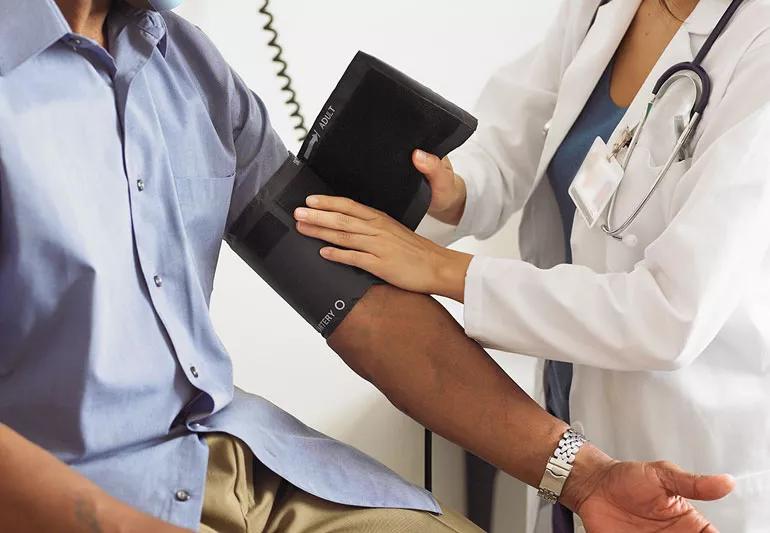Why you need them and which ones you need

Image content: This image is available to view online.
View image online (https://assets.clevelandclinic.org/transform/eda75854-d5b6-4bcd-8f51-0784df908a61/healthScreeningTests-200489719-770x533-1_jpg)
man having blood pressure checked in doctor's office
If you’re an adult who visits your primary care healthcare provider regularly, you’re probably used to having your blood pressure checked and having blood drawn to determine your cholesterol levels.
Advertisement
Cleveland Clinic is a non-profit academic medical center. Advertising on our site helps support our mission. We do not endorse non-Cleveland Clinic products or services. Policy
These are examples of health screening tests, which help healthcare providers identify as-of-yet undetected diseases or conditions in people who feel well and don’t have any symptoms. The goal is to diagnose illnesses early so they’re easier to treat.
But there are a lot of questions surrounding health screenings — like what health screenings should I get, and are they really necessary?
“When you’re thinking of health screenings, you should remember that some screening tests do have risks and outcomes that differ from person to person, so it’s always best to consult with your healthcare provider,” says family practitioner Matthew Goldman, MD.
There’s not a screening test for every health condition out there. Healthcare providers offer health screening tests for medical conditions based on the following criteria:
Advertisement
Colorectal cancer, for example, is a health condition that meets the above criteria.
Most colorectal cancers develop slowly over several years. But before a cancer develops, a growth of tissue or tumor usually begins as a non-cancerous polyp on the inner lining of the colon or rectum. These polyps generally don’t cause any symptoms, but they sometimes progress into cancer. So when a precancerous polyp is identified through colon cancer screening and removed, that prevents cancer from developing and has no negative effect on someone’s health or life expectancy.
However, when colorectal cancer develops and is diagnosed, the five-year survival ranges from 6% to 74%, depending on the stage of the cancer when it was found.
“When healthcare professionals consider the criteria for health screening, colon cancer does affect a significant number of people,” Dr. Goldman says. “There are also acceptable screening methods and treatments for it, and identifying and treating precancerous or early-stage cancer in the period before any symptoms start leads to better outcomes.”
So, because it meets screening criteria and the incidence of colorectal cancer starts to increase at age 45, it’s recommended that people of this age get this type of screening (except for people at high risk, who might need to start screening sooner).
In addition to screening for colorectal cancer, you should talk to your healthcare provider about the following:
Advertisement
Ovarian cancer is the second-most common gynecological cancer and the fifth leading cause of cancer deaths in women in the United States.
If it’s diagnosed at an earlier stage, the five-year survival rate can top 90%. The five-year survival rate drops to 25% if the diagnosis is made at a late stage.
The goal of screening, then, would be to diagnose ovarian cancer in its earliest stages when treatment would have the most beneficial effect on outcomes, Dr. Goldman says. Screening tests can include a pelvic exam, transvaginal ultrasound and CA-125 assay.
“Although there’s evidence to show that diagnosing ovarian cancer at early, asymptomatic stages leads to better survival, screening may not detect ovarian cancer in these earlier stages,” he says. “That’s why screening tests for ovarian cancer (and fallopian tube and primary peritoneal cancer) are still being studied in clinical trials.”
Also, existing screening strategies for ovarian cancer are associated with a high rate of false-positive tests that can lead to unneeded surgical procedures with risks of serious complications.
“As you can see in the case of ovarian cancer, there’s no evidence that screening leads to better outcomes,” Dr. Goldman emphasizes. “And with the tests currently available to diagnose ovarian cancer, screening can instead lead to significantly more potential harm than good.”
Advertisement
The overall message here is that screening recommendations vary, so it’s important to discuss the appropriateness of all screening tests with your provider.
“Your provider will review all of your risk factors and recommend the screenings they find important enough for your age and your overall health profile,” Dr. Goldman says.
Advertisement

Sign up for our Health Essentials emails for expert guidance on nutrition, fitness, sleep, skin care and more.
Learn more about our editorial process.
Advertisement
The who, what, why and how of skin checks
Colonoscopies and sigmoidoscopies are types of endoscopies, procedures that look at the health of your large intestine
A steady increase in cases in those younger than 50 started decades ago
If you’re at average risk, it’s recommended that you get your first colonoscopy at age 45
Your risk goes down once you quit, but you may still need a lung cancer screening
The importance of seeing your dentist twice a year
The link between cancer and eating red and processed meat
Type 2 diabetes isn’t inevitable with these dietary changes
Applying a hot or cold compress can help with pain
Pump up your iron intake with foods like tuna, tofu and turkey